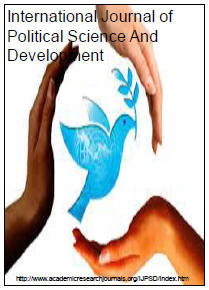| IJPSD |
International
Journal of Political Science and Development |
||||||||||||||||||||||
|
International Journal of Political Science and Development Vol. 3(3), pp. 152–158, March, 2015. DOI: 10.14662/IJPSD2015.022 ISSN: 2360-784X
Research Paper
Evaluating the Nature of Peace in the Contemporary Ethiopia’s Socio-Political Dynamism: A Galtung’s Peace (Negative and Positive) Perspective
Girmay Abraha
PhD. Candidate in Addis Ababa University, Institute for Peace and Security Studies. He is a Senior Lecturer at the Department of Civics and Ethical Studies, College of Social Sciences and Humanities, Samara University, Semera, Ethiopia. Email:gakl42@yahoo.com
Accepted 24 March 2015
The concept of peace remains notoriously difficult to define and
evaluate in contemporary states’ socio-political dynamism. Its
difficulty is, among other things, related to manifold perspectives it
makes for. This article has then selectively pursued Galtung’s peace
perspective to operationalize the conceptual immensity and come up with
viable peace evaluation maneuvers. The prime purpose of the paper is to
explain and evaluate the nature and mannerism of negative and positive
peace in the contemporary Ethiopia, popularly post 1991.
Methodologically, considerable scholarly literature and national
documents were explored and discussed through both descriptive and
critical discourse approaches. Personal observation was also used as a
supplementary tool in the entire appraisals. The finding of the entire
reviews recognized that the contemporary Ethiopia has relatively marked
a promotable national development and transformation than ever before;
however the quest for peace is still overlooked and demanding greater
attention, especially the positive version of peace as Galtung prompted
to ensure. The findings by far found out that the nature of negative
peace, which is popularly manifested by absent of internal destructive
conflicts, armed clashes and potential fear of violence, has seemingly
analogized with a snake under a glass that meant potentially at risk,
actually latent, and not yet fully realized in the contemporary
Ethiopia. Furthermore, the conclusion made from the details shown that
there have been nascent politico-democratic systems and structures,
uneven and multidimensional economic inequalities, social injustices,
persistent poverty and perilous environmental changes. All these,
without doubt, have mounted structural, cultural and ecological violence
that eventually lessened positive peace to its worst platform. In a
nutshell reveals, the nature of positive peace in contemporary Ethiopia,
more severe than the negative one, seems tacit, insubstantial and
insignificantly realized. At the end, hopes for holistic (negative and
positive) peace in the country shall therefore rest on the success of
the ruling regime itself to properly manage the heating destructive
internal conflicts and potential violence, and responsively reassure
all-rounded justice (political, social, economic) through enforcing
comprehensive socio-political policies, peace frameworks, and pro-poor
development strategies. Cite This Article As: Girmay Abraha (2015). Evaluating the Nature of Peace in the Contemporary Ethiopia’s Socio-Political Dynamism: A Galtung’s Peace (Negative and Positive) Perspective. Inter. J. Polit. Sci. Develop. 3(3): 152-158
|
|
|||||||||||||||||||||
